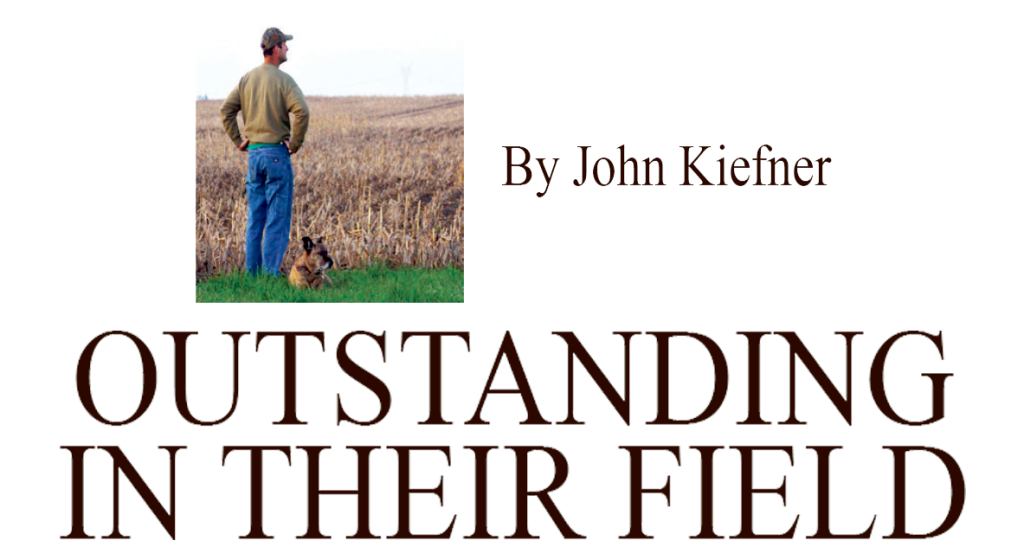Outstanding In Their Field

I have 3 quotes about corn that I often repeat for friends who are not astute about farming. Also, mosquito season will start in 3-2-1 …
Will this rainy spell be enough to produce abundant hay crops for the rest of 2023?
The severe dry pattern that had plagued the Midwest has finally abated. It was unlike anything I had ever seen before in my 43 years of farming. The end of May and all of June was dry, and brought some ridiculously dry air. Last year, we also had a serious dry spell the last 2 weeks of June. Let me explain the difference between dry and “dry,” in relation to being a hay farmer.
You can have a dry spell, void of rainfall, or you can have dry weather that is absent of rain. but has plenty of humidity that may make you very uncomfortable and appreciate air conditioning but can be beneficial to some plants.
Most of my life. I have tried to avoid getting my feet wet from walking through fields and grass in the morning during the spring season when the foliage is wet from the morning dew. High humidity each morning combined with heavy dews have always been a fact of life living in Will County.
We do not have Arizona or Las Vegas type dry air. Last year, in June 2022, we had an amazing dry stretch of weather the last 2 weeks that was void of any dew because of very low humidity and lacking rainfall. It was a haymaker’s dream.
This made it much easier to cut, rake, and bale hay without losing quality or quantity due to adverse weather. Of course, this causes drought stress on our row crops. But alas, last year it did start to rain again in July, and the crops we grew were about the best I had ever raised in my life for corn, soybeans, wheat, oats, and hay.
About the time our crops got a little stressed around the Independence Day holiday, the rains became frequent. It was much appreciated.
However, this year the “dry spell” with lack of rain and humidity, started the 2nd week of May and continued all the way to the end of June. I had never seen so many days in a spring with no morning dew. This did make hay baling much easier, but it also meant the yields were much lower since we lacked many of our normal spring rains. That dry spell also severely stunted our corn and soybean crops.
Now that it is raining again, and the weather forecast is for active storms for the foreseeable future, the crops look much better. The local wheat harvest has been concluding during the recent rains, and farmers were very relieved to see the yields were good, given that many fields had less than 2” of rain the previous 60 days before harvest.
It is commonly believed the wheat was spared due to its root system being well established and deep into the soil before the dry spell arrived. The roots were in moist subsoil, and that provided excellent yields of grain.
On the other hand, our corn and soybean crops were early in development during the recent drought, and the plants struggled as the roots were growing and chasing the moisture in the subsoil. Now with the recent rains, our corn has grown significantly. I am cautiously anxious to see what the corn yields will be this fall. Many agronomists have warned that the size of the ear on a corn plant is determined early in the plant’s growth, and stress can affect final yield despite good conditions later in the summer.
Now, for my 3 quotes: “If your lawn looks good, corn farmers are happy.” It takes a lot of rain to keep turf grass green in summer and that is good for corn.
“Corn likes it hot, as long as it has plenty of moisture.” We had the heat in June, but not the moisture.
“The corn crop is made in June, the soybean crop in August.” July is for fireworks, waving the flag and cursing humidity. I am hopeful that the stress of June delayed the corn crops’ development enough that July of this year is equal to June of a “normal” year.
Now that the hay fields are growing again, I am curious to see if it quits raining long enough to allow harvesting of 2nd cutting. The jury is still out on how the end of the hay season will be.